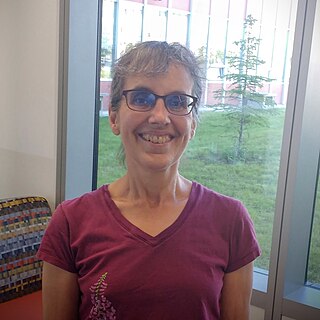Related Research Articles
Corpus linguistics is the study of a language as that language is expressed in its text corpus, its body of "real world" text. Corpus linguistics proposes that a reliable analysis of a language is more feasible with corpora collected in the field—the natural context ("realia") of that language—with minimal experimental interference. The large collections of text allow linguistics to run quantitative analyses on linguistic concepts, otherwise harder to quantify.

Charles Randolph Quirk, Baron Quirk, CBE, FBA was a British linguist and life peer. He was the Quain Professor of English language and literature at University College London from 1968 to 1981. He sat as a crossbencher in the House of Lords.

Mary Rosamond Haas was an American linguist who specialized in North American Indian languages, Thai, and historical linguistics. She served as president of the Linguistic Society of America. She was elected a fellow of the American Academy of Arts and Sciences and a member of the National Academy of Sciences.

The Linguistic Society of America (LSA) is a learned society for the field of linguistics. Founded in New York City in 1924, the LSA works to promote the scientific study of language. The society publishes three scholarly journals: Language, the open access journal Semantics and Pragmatics, and the open access journal Phonological Data & Analysis. Its annual meetings, held every winter, foster discussion amongst its members through the presentation of peer-reviewed research, as well as conducting official business of the society. Since 1928, the LSA has offered training to linguists through courses held at its biennial Linguistic Institutes held in the summer. The LSA and its 3,600 members work to raise awareness of linguistic issues with the public and contribute to policy debates on issues including bilingual education and the preservation of endangered languages.
Ahmar Mahboob is a Pakistani linguist. Currently he is an associate professor at the Department of Linguistics at the University of Sydney. He has worked in the fields of language policy development, pidgin and creole languages, NNEST studies, English language acquisition, English language teaching and teacher education, World Englishes, pragmatics, and minority languages in South Asia. Ahmar earned his PhD from Indiana University Bloomington in 2003, and has published extensively. He was the co-editor of TESOL Quarterly, alongside Brian Paltridge, for several years. He was also the Associate Editor of Linguistics and the Human Sciences and serves on the editorial boards of a number of journals. Ahmar has organised a number of regional, national, and international conferences and is the convenor and the co-creator of the Free Linguistics Conference.
Patricia Ann Keating is an American linguist and noted phonetician. She is distinguished research professor emeritus at UCLA.
Geoffrey Neil Leech FBA was a specialist in English language and linguistics. He was the author, co-author, or editor of more than 30 books and more than 120 published papers. His main academic interests were English grammar, corpus linguistics, stylistics, pragmatics, and semantics.

English is a West Germanic language in the Indo-European language family, whose speakers, called Anglophones, originated in early medieval England. The namesake of the language is the Angles, one of the ancient Germanic peoples that migrated to the island of Great Britain.
The British Association for Applied Linguistics (BAAL) is a learned society, based in the UK, which provides a forum for people interested in language and applied linguistics.
Attash Durrani was a Pakistani linguist, researcher, critic, author, educationist, and gemologist. He wrote more than 275 books and approximately 500 papers in Urdu and English. His main disciplines of study were language, education, computer science, and information technology. He was the recipient of the Tamgha-i-Imtiaz and Sitara-e-Imtiaz for his work of Urdu language and literature.
Elizabeth Closs Traugott is an American linguist and Professor Emerita of Linguistics and English, Stanford University. She is best known for her work on grammaticalization, subjectification, and constructionalization.
Li Wei is a British linguist, journal editor, and educator, of Manchu-Chinese heritage, who is currently the Director and Dean of the UCL Institute of Education, University College London. He is an elected Fellow of the British Academy, Member of Academia Europaea, Fellow of the Academy of Social Sciences, and Fellow of the Royal Society of Arts (RSA). Prior to his appointment as IOE's Director and Dean in March 2021, he held a Chair of Applied Linguistics, was Director of the Centre for Applied Linguistics at the UCL Institute of Education, and directed the ESRC UCL, Bloomsbury and East London Doctoral Training Partnership. Until the end of 2014, he was Pro-Vice-Master of Birkbeck College, University of London, where he was Chair of Applied Linguistics and Director of the Birkeck Graduate Research School. His research interests are in bilingualism and multilingualism. He founded a number of journals in linguistics and education.
David Michael Benjamin Denison is a British linguist whose work focuses on the history of the English language.
Colleen M. Fitzgerald is an American linguist who specializes in phonology, as well as language documentation and revitalization, especially with Native American languages.

Keren D. Rice is a Canadian linguist. She is a professor of linguistics and serves as the Director of the Centre for Aboriginal Initiatives at the University of Toronto.
Monica Macaulay is a professor of linguistics at the University of Wisconsin–Madison, where she is also affiliated with the American Indian Studies Program.
The International Computer Archive of Modern and Medieval English (ICAME) is an international group of linguists and data scientists working in corpus linguistics to digitise English texts. The organisation was founded in Oslo, Norway in 1977 as the International Computer Archive of Modern English, before being renamed to its current title.
Antonella Sorace,FBA, FRSE, FRSA, Professor of Developmental Linguistics, University of Edinburgh, since 2002; Founding Director, Bilingualism Matters, since 2008 |url=http://www.ukwhoswho.com/view/article/oupww/whoswho/U294916 |website=Who's Who 2023 |publisher=Oxford University Press |access-date=3 December 2022 |language=en |date=1 December 2022}}</ref>) is an experimental linguist and academic, specializing in bilingualism across the lifespan. Since 2002, she has been Professor of Developmental Linguistics at the University of Edinburgh. She a Fellow of British Academy, a Fellow of the Royal Society of Edinburgh and a Fellow of the Royal Society for the encouragement of Arts, Manufactures and Commerce.
Richard Milne Hogg, FBA, FRSE was a Scottish linguist who was well known for his research on Old English, phonology, and English dialects. He received his Ph.D. from Edinburgh University in 1975 presenting the thesis Determiner and quantifier systems in contemporary English under the supervision of Angus McIntosh and John Anderson. He was initially a lecturer in English at the University of Amsterdam from 1969 to 1973, then taught at the University of Lancaster; from 1980 until his death in 2007 he was Smith Professor of English Language and Medieval Literature at the University of Manchester. He served as dean of the arts faculty at Manchester from 1990 to 1993.

The School of English and American Studies (SEAS) of the Faculty of Humanities of the Eötvös Loránd University was founded in 1886 as Department of English Language and Literature and it is located in Rákóczi út in Józsefváros, Budapest, Hungary. Along with the Department of English of the University of Vienna, the School of English and American Studies is one of the biggest English departments in Central Europe.
References
- ↑ Albu, Rodica (2010). "On the First ISLE Conference and Related Topics". Linguaculture. 1: 117–123. doi: 10.47743/lincu-2010-1-0228 . S2CID 248010156.
- ↑ "Notes for Contributors". English Language and Linguistics. 17 (1): b1–b2. Mar 2013.
- ↑ "Societies". The LinguistList. Retrieved July 20, 2015.
- ↑ "International Society for the Linguistics of English: Constitution" . Retrieved July 20, 2015.[ permanent dead link ]
- ↑ Green, Eugene and Charles F. Meyer (2014). The Variability of Current World Englishes. Walter de Gruyter. pp. v.
- ↑ "Elena Seoane appointed Review Editor of English Language and Linguistics (C.U.P.)". April 18, 2015. Retrieved July 26, 2015.
- ↑ Kortmann, Bernd and Monika Schulz (2009). "Conference Report: The linguistics of English – setting the agenda". English Today. 25 (3): 59–62. doi:10.1017/S0266078409990319.
- ↑ "First Triennial Conference of the International Society for the Linguistics of English" . Retrieved July 26, 2015.
- ↑ "Boston University English Department" . Retrieved July 26, 2015.
- ↑ "The International Society for the Linguistics of English (ISLE) Conference 24-27 August 2014". University of Zurich. Retrieved July 26, 2015.
- ↑ "HEL on the Web" . Retrieved July 26, 2015.
- ↑ "UCL Survey of English Usage, UCL". www.ucl.ac.uk. Retrieved 2015-09-20.
- ↑ ""In Memory of Geoffrey Leech (1936-2014)" by Short, Mick - European English Messenger, Vol. 23, Issue 2, Winter 2014". Archived from the original on 2016-01-05.
- ↑ "Richard M. Hogg Prize". 2009. Retrieved July 12, 2015.
- ↑ "FYI: 2012 Richard M. Hogg Prize (ISLE)". The Linguist List. Retrieved July 12, 2015.
- ↑ Goldman, Lawrence (2013). Oxford Dictionary of National Biography 2005-2008. Oxford University Press. p. 562.
- ↑ "Professor Jeremy Smith". University of Glasgow . Retrieved August 30, 2019.